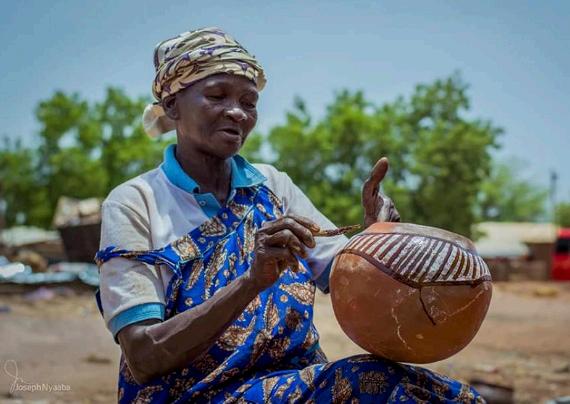
3 minute read
LIVING the INCARNATION
“A Constant Exuberance” by Gifty Abane, SHCJ
RE-SOURCE #1 — February 2 – May 27, 2023


Incarnation is an art of conscious daily expression of what and who I am in every facet of life, and in the sight of the Creator God — aa continual process of becoming my best self thus clearing and sharpening my senses in the light of “the incarnate word;” aa creative expression of the divine in every activity of my day, and that of others, just as potters inscribe their giftedness on their wares with passion and a sense of co-creating. Incarnation is “the behind-the-scenes energy of creativity” a a great sense of zeal that burst forth in the classroom, as gardening, cooking, singing, decorating, designing, weaving, at table, dancing, you name it; aan overpowering grace in acceptance of pain, suffering, rejection, crisis, fear and despair. Incarnation is a constant exuberance in concrete terms of a divine grandeur expressed in every possible human experience.
Echoes
The mystery of the Incarnation, according to Ronald Rolheiser, OMI, is “God taking on human nature and dealing with human beings in a visible, tangible way.” God calls on us to continue to give his Incarnate Word to families, friends and strangers alike, in our homes, workplaces and our world. The Word, he says, is Incarnate when we:
God became human and continues to be so, each time I allow God to use me to further the Kingdom. So, God becomes flesh again in me and through me, touches & transforms lives. The same effect is multiplied in people of faith who let God fill their lives with the Spirit, & allow God’s kingdom to come in them, & God’s will to be done in them, & through them in others. Louisa

Huni-Dadzie, SHCJ
Live with integrity as Jesus did. Care for others, treat others with dignity and respect. Affirm the goodness in others, when we lift up others. Forgive, no matter the hurt, as Jesus did. Open our eyes and ears to heed and respond as best as we can. Spread joy to others; work to bring justice and hope to others.
Felicity Amikiya, SHCJ
THE DARK NIGHT OF THE SOIL: A Book Review in THE TABLET, 18 March 2023
RE-SOURCE #1 — February 2 – May 27, 2023

Journalist Austen Ivereigh reports on an interview with Norman Wirzba about his recently published 15th book, Agrarian Spirit: Cultivating Faith, Community and the Land. In this book, says Ivereigh, Wirzba “argues that only by living and working with nature in ways that are mutually beneficial can we recover an authentic spirituality.” Below are several excerpts from Ivereigh’s complete account in THE TABLET which can be accessed at — https://www.thetablet.co.uk/
Wirzba, a Canadian theologian and ecologist, is the Gilbert T. Rowe Distinguished Professor of Christian Theology at Duke Divinity School and senior fellow at the Kenan Institute for Ethics at Duke University in Durham, NC.
…. Agrarian Spirit – Wirzba’s fifteenth book – proclaims from the treetops that an authentically incarnate, embodied, landed spirituality is absolutely central to Christian life and thought. “By saying that God is an agrarian God, I want to say very clearly that land is not optional,” Wirzba tells me with passion. “Because once you say it’s optional, you’ve denied embodiment. Because you can’t make sense of a human body apart from all the bodies – soil, water, microbes, fish, birds, weather patterns – we are connected to. And this is a scientific fact but also a theological fact, because God’s covenant from the beginning is with the whole of Creation.”
Agrarian spirituality, then, “is to take embodiment seriously:” it is at the heart of the story that culminates in, and begins from, the Incarnation of Jesus. From which it follows that the ways in which people satisfy their basic, inescapable, human needs — to eat, breathe, clothe themselves, seek shelter — are all inextricably moral, spiritual questions that demand our attention and action.
Agrarian spirituality ... is at the heart of the story that culminates in, and begins from, the Incarnation of Jesus.
…. It is not enough to hear what is happening; in order to care for Creation we must care about it. Which means entering what Wirzba calls a “dark night of the soil,” an agrarian mysticism that journeys into the presence of God via Creation, learning who and how God is, through habits and practices of faith that people can cultivate “to participate in God’s gardening and farming ways with the world.”
A reviewer on www.amazon.com observes that this book “explores how agrarian sensibilities and responsibilities transform the practices of prayer, perception, mystical union, humility, gratitude, and hope. Wirzba provides an elegant and compelling account of spiritual life that is both attuned to ancient scriptural sources and keyed to addressing the pressing social and ecological concerns of today.”
A








